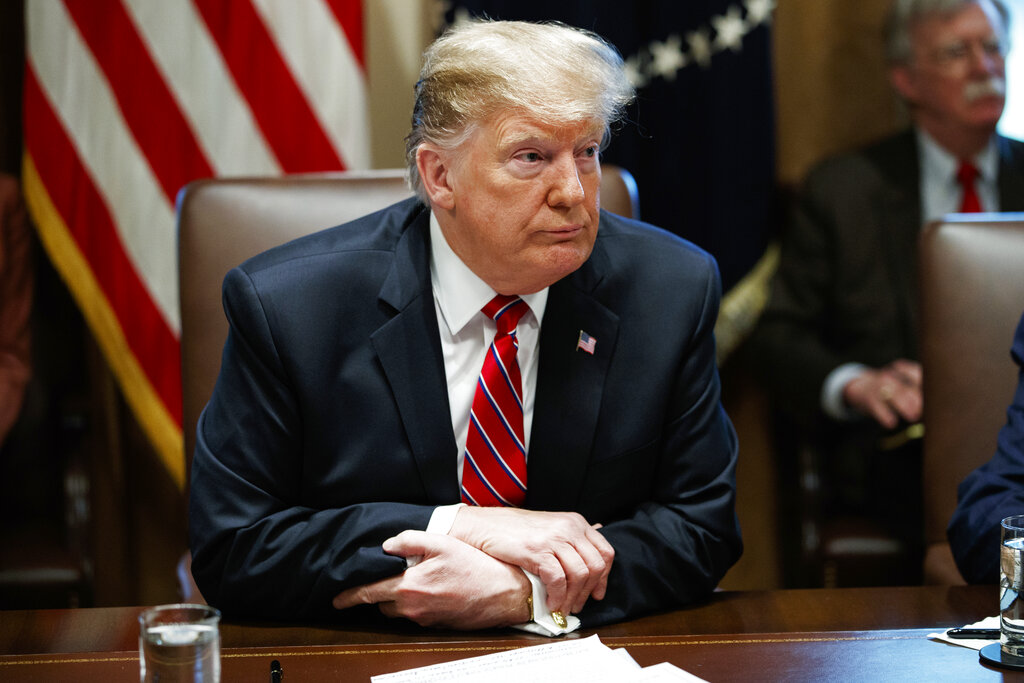He heard from his generals and his diplomats. Lawmakers weighed in and so did his advisers. But among the voices that rang powerfully for President Trump was that of one of his favourite Fox News hosts: Tucker Carlson.
While national security advisers were urging a military strike against Iran, Carlson in recent days had told Trump that responding to Tehran’s provocations with force was crazy. The hawks did not have the President’s best interests at heart, he said.
And if Trump got into a war with Iran, he could kiss his chances of re-election goodbye.
However much weight that advice may or may not have had, the sentiments certainly reinforced the doubts that Trump himself harboured as he navigated his way through one of the most consequential foreign policy decisions of his presidency. By his own account, the President called off the “cocked & loaded” strike on Thursday night with only 10 minutes to spare to avoid the estimated deaths of as many as 150 people.
The concerns that Trump heard from Carlson reflected that part of the presidential id that has always hesitated at pulling the trigger.
Belligerent and confrontational as he is in his public persona, Trump has at times pulled back from the use of force, convinced that America has wasted too many lives and too much money in pointless West Asian wars and wary of repeating what he considers the mistakes of his predecessors.
As Carlson and other sceptics have argued, a strike against Iran could easily spiral into a full-fledged war without easy victory. That, Trump was told, was everything he ran against. And so the President struggled into the early evening, committed to taking action to demonstrate resolve right up until the moment he decided against it and called off the warplanes and missile launchers.
“To those who want to criticise the President, I would say they ought to be thankful they’re not the ones having to make that decision,” said Senator Jim Risch, Republican of Idaho and the chairman of the Foreign Relations Committee, who was among the lawmakers at the White House that day.
“I watched him really agonise over this.”
The full story of how Trump set in motion an attack on another country and then cancelled it remained to some extent shrouded in mystery even to some of those involved, according to interviews with administration officials, military officers and lawmakers, many of whom asked not to be named.
On the day after the aborted strike, multiple, seemingly conflicting accounts emerged and the White House made no effort to reconcile them, choosing to stay silent about the deliberations. A spokeswoman for Fox News declined to comment.
One thing made clear yet again, however, was just how different Trump’s decision-making process is from those of other Presidents, even on the weightiest of issues to confront a commander in chief.
Meetings and memos aside, he trusts his instincts more than institutions, reaches out to unconventional sources of guidance and is willing to defy a roomful of advisers.
He has not had a Senate-confirmed defence secretary for nearly six months, and the acting secretary resigned this week. And those advisers he does have were busy trying to outmaneuver each other.
Trump had been resisting a military response to repeated provocations by Iran for weeks by the time he woke up on Thursday morning to discover that an American spy plane had been shot down.
On Thursday morning, only hours after the drone was shot down, Bolton met for breakfast at the White House at 7am with Patrick Shanahan, the acting defence secretary who had announced his resignation just three days earlier, as well as with Mark T. Esper, the army secretary set to replace Shanahan, secretary of state Mike Pompeo and Gen. Joseph F. Dunford Jr, the chairman of the Joint Chiefs of Staff.
The group discussed the drone episode and agreed on a possible military response to recommend to the President, according to an administration official. At 11am, the same group along with other national security officials met Trump to brief him on options for a strike on Iran. According to one administration official, the potential casualties of such an attack were discussed at that meeting.
But as usual, Trump did not rely exclusively on his official team.
Among the outsiders he talked with in the morning was Senator Lindsey Graham, Republican of South Carolina and a close ally. Graham urged that he consider a military response to the drone’s shooting down.
At 3pm, Trump hosted congressional leaders in the Situation Room to brief them about the episode and outline the alternative responses.
At least some of those in the room left assuming that he was likely to order a strike.
Trump was given a list of at least a dozen strike options generated this month after there were attacks on tankers in the region. The list was then narrowed down to at least two alternatives. Among the targets would be facilities like radar and missile batteries.
Administration officials said on Friday that the President’s national security team was unanimous in favouring a response and all agreed with the final option recommended to Trump.











